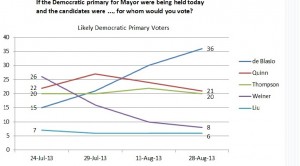Dear Commons Community
David H. Autor, professor of economics at the Massachusetts Institute of Technology, and David Dorn, an assistant professor of economics at the Center for Monetary and Financial Studies in Madrid, have a featured article in today’s New York Times on technology, the economy and employment. The focus of the article is on technology and the changing the nature of work in this country. For example:
“…the United States has two million fewer jobs than before the [The Great Recession] downturn, the unemployment rate is stuck at levels not seen since the early 1990s and the proportion of adults who are working is four percentage points off its peak in 2000.
This job drought has spurred pundits to wonder whether a profound employment sickness has overtaken us. And from there, it’s only a short leap to ask whether that illness isn’t productivity itself. Have we mechanized and computerized ourselves into obsolescence?
Are we in danger of losing the “race against the machine,” as the M.I.T. scholars Erik Brynjolfsson and Andrew McAfee argue in a recent book? Are we becoming enslaved to our “robot overlords,” as the journalist Kevin Drum warned in Mother Jones? Do “smart machines” threaten us with “long-term misery,” as the economists Jeffrey D. Sachs and Laurence J. Kotlikoff prophesied earlier this year? Have we reached “the end of labor,” as Noah Smith laments in The Atlantic?
The simplest answer to these questions is basically “yes’.
What do we, especially young people, do about it?
“A starting point for discussion is the observation that although computers are ubiquitous, they cannot do everything. A computer’s ability to accomplish a task quickly and cheaply depends upon a human programmer’s ability to write procedures or rules that direct the machine to take the correct steps at each contingency. Computers excel at “routine” tasks: organizing, storing, retrieving and manipulating information, or executing exactly defined physical movements in production processes. These tasks are most pervasive in middle-skill jobs like bookkeeping, clerical work and repetitive production and quality-assurance jobs.
Logically, computerization has reduced the demand for these jobs, but it has boosted demand for workers who perform “nonroutine” tasks that complement the automated activities. Those tasks happen to lie on opposite ends of the occupational skill distribution.
At one end are so-called abstract tasks that require problem-solving, intuition, persuasion and creativity. These tasks are characteristic of professional, managerial, technical and creative occupations, like law, medicine, science, engineering, advertising and design. People in these jobs typically have high levels of education and analytical capability, and they benefit from computers that facilitate the transmission, organization and processing of information.
On the other end are so-called manual tasks, which require situational adaptability, visual and language recognition, and in-person interaction. Preparing a meal, driving a truck through city traffic or cleaning a hotel room present mind-bogglingly complex challenges for computers. But they are straightforward for humans, requiring primarily innate abilities like dexterity, sightedness and language recognition, as well as modest training. These workers can’t be replaced by robots, but their skills are not scarce, so they usually make low wages.”
Autor and Dorn make the following recommendations:
“…computerization is not reducing the quantity of jobs, but rather degrading the quality of jobs for a significant subset of workers. Demand for highly educated workers who excel in abstract tasks is robust, but the middle of the labor market, where the routine task-intensive jobs lie, is sagging. Workers without college education therefore concentrate in manual task-intensive jobs — like food services, cleaning and security — which are numerous but offer low wages, precarious job security and few prospects for upward mobility. This bifurcation of job opportunities has contributed to the historic rise in income inequality.
How can we help workers ride the wave of technological change rather than be swamped by it? One common recommendation is that citizens should invest more in their education. Spurred by growing demand for workers performing abstract job tasks, the payoff for college and professional degrees has soared; despite its formidable price tag, higher education has perhaps never been a better investment. But it is far from a comprehensive solution to our labor market problems. Not all high school graduates — let alone displaced mid- and late-career workers — are academically or temperamentally prepared to pursue a four-year college degree. Only 40 percent of Americans enroll in a four-year college after graduating from high school, and more than 30 percent of those who enroll do not complete the degree within eight years.”
There are important suggestions in this article. Those of us in higher education need to be cognizant of what we are doing for our students especially in how we advise them on majors and careers. And perhaps most important in how we assist them in graduating.
Tony



